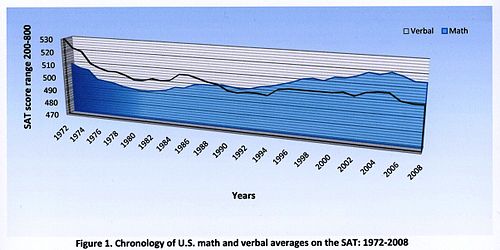Steve Sailor and and Steve Hsu have new posts about education and IQ.
Hsu’s post mentions that the infamous Terman IQ Study excluded Nobel laureates Shockley and Alvarez, possibly because highly verbal loaded test hurt their score, causing them to narrowly miss the cut-off.
iSteve, referencing an article originally in the New York Times, discusses how many Americans are illiterate regarding math.
It’s odd how math is being held as this paragon of difficulty when the evidence, on the other hand, suggests verbal is harder than math. Yes, the useless literary arts major may be harder than a STEM degree. The NYT article laments how Americans are bad at math, but I can wager they are even worse at writing, grammar, and reading. Let’s take a look at the discrepancy between verbal and numeracy scores on the GMAT:

Such a discrepancy also exists on the SAT and GRE, with verbal scores being lower than math. From Wikipedia

There are many explanations, but how about the simplest one, which is that verbal is hard. Some of these tests ask the definitions of words that individuals seldom, if ever, encounter in their school reading or in conversation. The presumption is that those who do more reading outside of the classroom will score higher, and this is true, but it could also be that verbal ability, not math ability, is better correlated with IQ – or – that verbal scores have a higher correlation with IQ than math scores.
Another possibility is that verbal, being harder, has a higher ceiling than math and that harder math questions are needed to even it out. Not so sure if that would be effective. Verbal, unlike math, cannot be reliably taught beyond the fundamentals. With some patience, you can conceivably teach a person of average intelligence fairly advanced math, but you cannot cram thousands of obscure words into his head or make him better adept at digesting long, complicated reading passages in a time limit. Math has a ‘plug and chug’ element to it, whereas verbal requires the synthesis of the rules of grammar and style. If you make harder math questions, people will adapt and scores will go up.
I’ve always marveled at how authors can put words together in the precise order to both convey a message and captivate the reader…seems much harder than arranging symbols to make an equation, and from personal experience doing both, it is. People are impressed by calculus…nah that’s not impressive or hard…writing 500 words that aren’t full of grammatical errors and malapropisms and doesn’t read like total juvenile/amateur shit…that’s way harder.
Ultimately, we’re simply expecting too much from the double-digit IQ masses that fill the public schools. Studies show that the average IQ of a high school graduate is around 100, so many should be expected to fail. Harder standards will mean more failures and or more coddling to make slow kids catch up. The former is bad for the morale of the student and the latter will drive up education costs even more, as well as defeating the purpose of having higher standards.